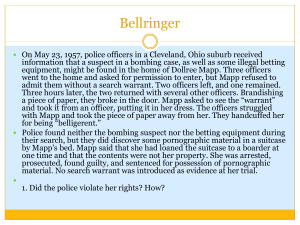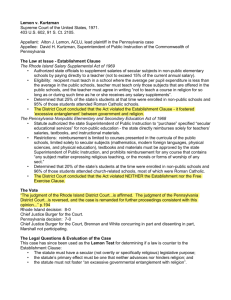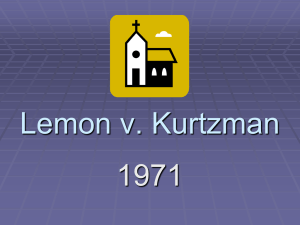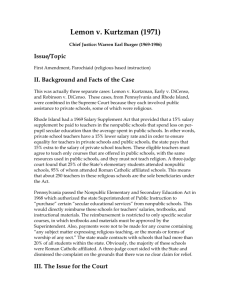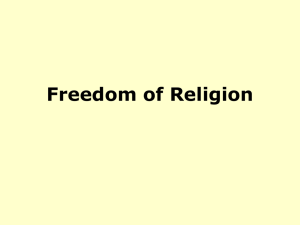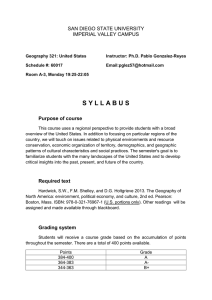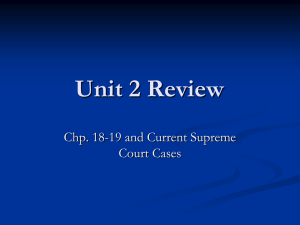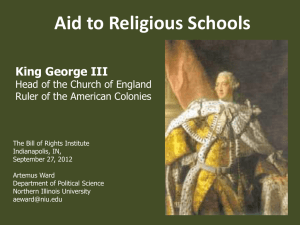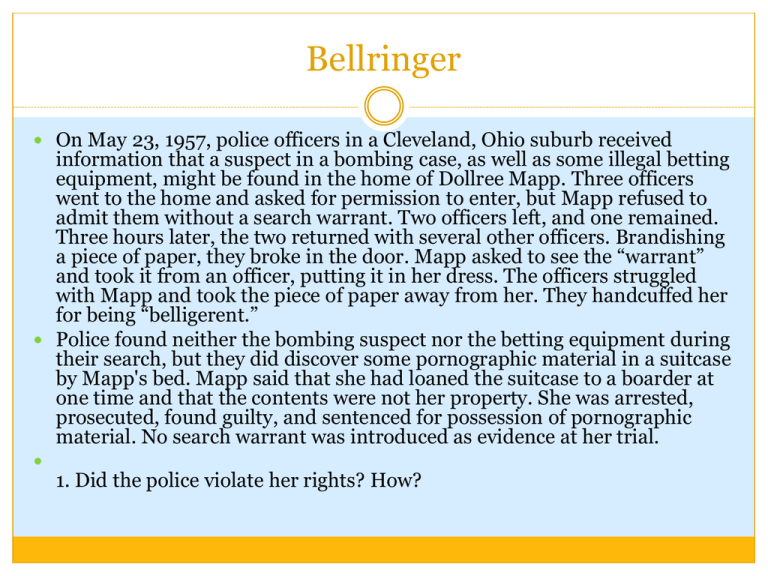
Bellringer
On May 23, 1957, police officers in a Cleveland, Ohio suburb received
information that a suspect in a bombing case, as well as some illegal betting
equipment, might be found in the home of Dollree Mapp. Three officers
went to the home and asked for permission to enter, but Mapp refused to
admit them without a search warrant. Two officers left, and one remained.
Three hours later, the two returned with several other officers. Brandishing
a piece of paper, they broke in the door. Mapp asked to see the “warrant”
and took it from an officer, putting it in her dress. The officers struggled
with Mapp and took the piece of paper away from her. They handcuffed her
for being “belligerent.”
Police found neither the bombing suspect nor the betting equipment during
their search, but they did discover some pornographic material in a suitcase
by Mapp's bed. Mapp said that she had loaned the suitcase to a boarder at
one time and that the contents were not her property. She was arrested,
prosecuted, found guilty, and sentenced for possession of pornographic
material. No search warrant was introduced as evidence at her trial.
1. Did the police violate her rights? How?
http://content.time.com/time/vide
o/player/0,32068,1754465091001
_2120441,00.html
First Amendment Freedoms
CHAPTER 10
First Amendment
Congress shall make no law respecting an
establishment of religion, or prohibiting the free
exercise thereof; or abridging the freedom of speech,
or of the press; or the right of the people peaceably to
assemble, and to petition the government for a
redress of grievances.
Lemon v. Kurtzman, 403 U.S. 602 (1971)
Facts:
Pennsylvania and Rhode Island statutes provided
state aid to church-related elementary and secondary
schools. A group of individual taxpayers and
religious liberty organizations filed suit, challenging
the constitutionality of the program. They claimed
that, since the program primarily aided parochial
schools, it violated the Establishment Clause.
Establishment Clause
Government cannot take actions that create
an official religion or support one religion
over the other.
Establishment Clause is often questioned in
cases concerning education.
Lemon vs. Kurtzman (public support for non
religious courses)
Limitations on the Free Exercise Clause
A Person has the right to hold any religious beliefs
they choose.
Government can punish illegal drug use even if the
drug use is a part of a religious practice.
Ex. Reynold vs. U.S. -polygamy
Government can forbid it because it is against social
norms.
Lemon Test
1. It must have a secular, or non religious, purpose.
2. Its major effects must neither, advance nor inhibit
religion.
3. It must not encourage excessive government
entanglement with religion.
Non protected Speech
Four categories:
Libel-written defamation of another person
Obscenity(Miller vs. California)
Fighting Words-Unconstitutionally protected
because their very utterance may inflict or tend to
incite an immediate breach of peace.
Commercial Speech – advertisements and
commercials for products and services
Campbell vs. Acuff-Rose Music
Is this explicit?
Big hairy woman, you
need to shave that stuff,
Big hairy woman, you
know I bet it's tough.
Big hairy woman, all that
hair ain't legit,
'Cause you look like
Cousin It.
Big hairy woman
Banned Speech-Alien and Sedition ACTS
Treason
Sedition
Making war against
Speech or actions that
the United States and
giving aid and comfort
to its enemies.
inspire revolt against
the government
Review Questions
1. What is the Establishment Clause?
2. What are two limitations placed on the Free
Exercise Clause?
3. Identify and explain three of the non protected
forms of speech.
4. Compare and Contrast sedition versus treason.
Bellringer
My right to swing my fist
ends where it meets your
nose.” What does this
mean?
Cult -a system of religious veneration and devotion
directed toward a particular figure or object.
Religion is an organized collection of beliefs, cultural
systems, and world views that relate humanity to an
order of existence.
Chapter 10
Pages 284
Questions 1-3
Page 302
Questions 1-4
http://www.youtube.com/watch?v=xfht6DveCRc
Prior Restraint
Symbolic Speech
Government action
Communications
that seeks to prevent
materials from being
published.(Ex.
President Nixon and
the Pentagon Papers)
of ideas through
symbols and
speech.
Freedoms of Assembly and Petition
Government can only intervene in cases
where protestors encourage others to
commit violent acts.
Freedom of association the right to join with
others, share ideas and work toward a
common purpose.
Miller vs. California
Facts. In this case, the Appellant, Miller (Appellant), conducted a mass
mailing campaign to advertise the sale of illustrated adult material books. The
Appellant’s conviction was specifically based on his conduct in causing five
unsolicited advertising brochures to be sent through the mail. The brochures
consist primarily of pictures and drawings very explicitly depicting men and
women in groups of two or more engaging in a variety of sexual activities, with
genitals often predominantly displayed. This case thus involves the application
of a state’s criminal obscenity statute to a situation in which sexually explicit
materials have been thrust by aggressive sales action upon unwilling recipients.
Basic guidelines for a trier of fact in an obscenity matter must be: (a) whether the average
person, applying contemporary community standards, would find that the work, taken as a
whole, appeals to the prurient interest; (b) whether the work depicts or describes, in a patently
offensive way, sexual conduct specifically defined by the applicable state law and (c) whether
the work, taken as a whole, lacks serious literary, artistic, political or scientific value.
Explicit Rights in the First Amendment
Writ of Habeas Corpus
Ex Post Facto Law- Retroactive criminal law that
works to the disadvantage of a person.
For example, your local town has a littering problem.
Littering is entirely legal in town. A law is written to
ban littering, but lawmakers want to catch
perpetrators who have already been littering so they
make the law effective as of five years ago.
Lemon v. Kurtzman: The Background
The trial of Lemon v. Kurtzman was a groundbreaking case that took place in
Pennsylvania. The case began because the state of Pennsylvania passed a law that allowed the
local government to use money to fund educational programs that taught religious-based
lessons, activities and studies. This law was passed through the Non-public Elementary and
Secondary Education Act of 1968. The case of Lemon v. Kurtzman was filed by Alton Lemon,
a Pennsylvania instructor who claimed that the state had violated the United States
Constitution by passing the law mentioned above. Lemon believed that Pennsylvania violated
the 1st Amendment to the United States Constitution because the Constitution does not allow
the establishment of any state laws or legislation that combine the interests of religious
people with the interests of the state’s population. This is known as the Separation of Church
and State. The government is not allowed to place the interest of any organization or
institution above the interests of the general population. Using these Amendments, Lemon
believed that the state of Pennsylvania unfairly funded religious programs that did not appeal
to the state’s general population.
1.
Explain in detail how this case violated the Establishment Clause?
http://www.bjs.gov/content/pu
b/pdf/cp11st.pdf
CAPITAL PUNISHMENT
Misdemeanor
Felony
Indecent Exposure
Traffic Violations
Theft
Assault
Murder
Rape
Arson
Sale of Illegal drugs
Grand theft
Kidnapping
Jail sentence for 6mths
to 1 year.
Felonies are broken down
in classifications when it
comes to punishment.
Degrees of Murder and Manslaughter
Murder
Manslaughter
1st Degree Murder-
Voluntary ManslaughterIntentional killing that is
accompanied by additional
circumstances that mitigate
(crimes of passion)
Committed with deliberation
and premeditation
2nd Murder is committed
during the commission of a
felony (Felony Murder Rule)
3rd Killing that results from
indifference or negligence
Involuntary
Manslaughter- Death
occurs a result of a
misdemeanor.
Chapter 10 CIVIL LIBERTIES
Section 1, 3 and 4
Please define the terms from all four
sections .
Bowers v HARDWICK
Bowers v. Hardwick (1986)
In Bowers v. Hardwick (1986), the Supreme Court ruled that the Constitution does
not protect the right of gay adults to engage in private, consensual sodomy. The case
began in August 1982, when Atlanta police arrived at the residence of Michael
Hardwick to arrest him for failing to appear in court on charges of public drinking.
A roommate let the police into Hardwick's home. As the police searched for
Hardwick in the house, they noticed a door partly open. Peering in, they found
Hardwick and a male companion engaged in oral sex. Hardwick and his partner
were arrested on charges of violating the Georgia Sodomy Statute, which stated that
"a person commits the offense of sodomy when he performs or submits to any
sexual act involving the sex organs of one person and the mouth or anus of another"
and "a person convicted of the offense of sodomy shall be punished by
imprisonment for not less than one nor more than 20 years." Hardwick sued the
state of Georgia, claiming that the sodomy statute violated the Constitution. After
Hardwick prevailed in a federal appellate court, Georgia appealed to the U.S.
Supreme Court, which reviewed the case in 1986.
http://www.youtube.com/watch?v=bKicIslq76s

